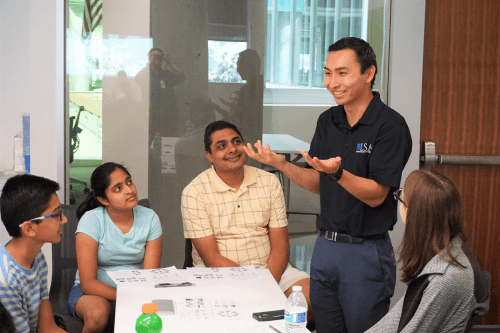Do High Expectations Help Children?
October 28, 2021
What’s the purpose of High Expectations?
 Every parent wants their children to grow up to be the best they can be. They don’t want their children to miss out on any opportunity and want to give their children all the opportunities they did not receive. This is why many parents have high expectations for their children. What does it mean to have high expectations? It means that a parent is looking for their child to do more or be better than they are currently doing. The real question is why do parents want their children to do better than they currently are doing? The answer is they don’t really know how well a child has to do to succeed. Thus, all they know is that whatever their child is doing is not good enough.
Every parent wants their children to grow up to be the best they can be. They don’t want their children to miss out on any opportunity and want to give their children all the opportunities they did not receive. This is why many parents have high expectations for their children. What does it mean to have high expectations? It means that a parent is looking for their child to do more or be better than they are currently doing. The real question is why do parents want their children to do better than they currently are doing? The answer is they don’t really know how well a child has to do to succeed. Thus, all they know is that whatever their child is doing is not good enough.
This idea of a child not doing good enough is a dangerous one. One that is not conducive to a child’s growth and development. This idea is closely associated with several keywords: lacking, failing, inadequate, “not trying”, lazy, etc.
None of these words are uplifting or motivating for a child, especially if they are doing the best that they can do. This leads children to believe “I’m not good enough” and this is a dangerous place to be. Every child is doing the best they can do under the situation they are in.
Many parents don’t realize that a child’s capability is not only based upon their IQ. It is based on all the factors of the child and their environment. For example, a child might be naturally excel at math, however, because they don’t have a good ability to focus and manage their time, they might not get good grades in their math class. Another situation might be that a very responsible and intelligent student is not doing well in their classes because they love to be on social media and video games. In both these situations, the parents think their child can do better because they are intelligent, but they didn’t take into account the lack of time management or lack of motivation. As much as you wish a child didn’t have these other limitations or distractions, they do, and because of them, the child doesn’t have the capability to do better. They are doing the best they can do with their personal limitations and their environment. There are so many reasons why a child might have the intelligence but is still not capable of meeting your expectations. This could range from not liking their teacher, to a lack of capability in another area of life that is impacting their grades or their behavior.
The Quickest Way to Improve
There are two dominant ways to help people improve quickly, these are:
- Helping them understand themselves
- Letting them grow at their own pace
Not only are both of these logical in why they allow people to improve quickly, but there have also been many real-life examples showing the results of these two methods of helping people.
 The first way is helping them understand themselves. People will always develop quicker and do better when they are naturally good at something. They are also more likely to enjoy it—which will enable them to spend more time on it and then enable them to improve at it more rapidly than others. It seems like common sense that when you allow a fish to focus on swimming it will excel a lot more than if you try to teach it to fly or to run. The trick is giving them a good support, but also enough freedom to figure out who they are.
The first way is helping them understand themselves. People will always develop quicker and do better when they are naturally good at something. They are also more likely to enjoy it—which will enable them to spend more time on it and then enable them to improve at it more rapidly than others. It seems like common sense that when you allow a fish to focus on swimming it will excel a lot more than if you try to teach it to fly or to run. The trick is giving them a good support, but also enough freedom to figure out who they are.
The second way of helping people is to accept where they are at and allow them to progress naturally. The reason for this is because of what it takes to develop. When it comes to personal development, you must go step by step—there is no shortcut and people can’t make big jumps, despite what people think. The example I like to give is learning math. When a student doesn’t understand the basic operations such as addition, subtraction, multiplication, and division, it is hard for them to do more complex things. If you tried to get someone to learn calculus and they didn’t know the basics, then it would not only be impossible, but they couldn’t advance at all. But if someone took the time to help them go step by step, they would eventually learn calculus and be able to advance to even more complex mathematics. This is the same way with helping students develop. If a student doesn’t know the material and can’t pay attention in class, then it’s unrealistic to expect them to take notes, be responsible for knowing what their grade is, doing well on tests and, in the end, get an A in the course. This is just like asking them to learn Calculus when they don’t know any math.
What makes this more difficult is that everyone is different and there is not as simple as a progression on development of a child as there is in learning math. For Michael Phelps, if someone didn’t realize he needed an avenue to let his energy out, he might never have gotten through school, much less become an Olympic gold medalist. It must have taken a lot of perception to realize his natural gift for swimming—football or another sport might not have done the same thing for him. Bill Gates is another great example—if his parents didn’t figure out he loved programming, he might have turned out very different.
The Best Way to Help Your Child: Accept Them
The best way to help your child develop and become successful is to have no expectations and to accept your child for who they are. Not only does it work, but it also requires the least amount of work. This is what businesses have found out. It is much more difficult to change their employees than to accept them and utilize them for their natural strengths. Not only do they work more effectively, but the employees actually develop quicker and are happier.
Thus, why wouldn’t you get rid of the expectations? There are a couple of reasons this is hard:
- You have to know where your child is at: Many times, parents don’t even know they have expectations on their children. They think their child is more advanced in something than they are.
- Lack of Information: In many cases, a parent might not know the detriment expectations have on a child. They have not researched human development and learned what will help their child the most.
- Lack of patience: Many times, having expectations is not only for the child, but also for the parent. It is painful to watch a child who is “throwing their life away”. It is also painful to be around someone who is developing. When a person is developing, they think about themselves more, are less responsible, make more mistakes, cost more money, and require more time and attention. This can become tiring.
How Do You Know You Have High Expectations?
You know you have high expectations if you consistently tell your child what to do better in an area and they don’t, or it causes them a lot of stress. If you are able to change something or say something and your child improves and is not stressed, then you know you didn’t have an expectation and your child had the capability to do it. The other indicator of high expectations is resistance. If a child is able to do something easily then usually, they don’t resist.
5 Things you can do to Accept Your Child
Here are five things a parent or leader can do to accept a child and not have high expectations:
- Observe and listen: The more you watch and listen to your child, the more you will realize who they are and the limitations they have.
- Get advice: If you have an issue with your child and feel like they should be doing better, talk with someone about it. Especially find someone who understands children and how they develop. Even talking with other parents can give you advice and more understanding on the situation.
- Get educated: The more you realize that expectations detriment your child, the easier it will be for you to minimize your expectations and try to find another way to help your child. Knowledge helps a person change.
- Do things with them: Sometimes it helps to not only observe and listen, but to actually do something with your child. It will help you see how they operate, the issues they have and what you can do to help them. How a child plays a video game, sport, or anything is how they perform in school or any other area in life.
- Work with them: This is the most difficult and you must know your child the most do to this, but make a plan with them. Discuss what is reasonable, how you can help them, what they think, what they think is important. The important thing to remember is that you are looking for just the next step in improvement. It might not be in the area you want, but as long as you see improvement, it is a good direction.
More information on our mentoring strategy, make sure to check out my book No-Influence Mentoring.
About the Author
Read more about Dr. Jacob’s latest book.
Dr. Jacob Kashiwagi is business management consultant and acting Chairman of the Board for Leadership Society of Arizona. Dr. Jacob has worked on 1,100+ industry projects valued at $3.6 billion with a 95% success rate. He has taught over 1,300 college students and 2,500 high school students.

